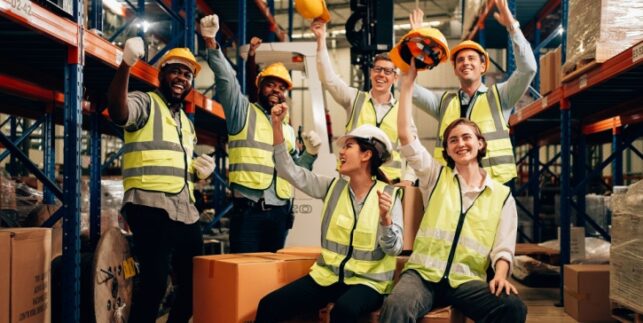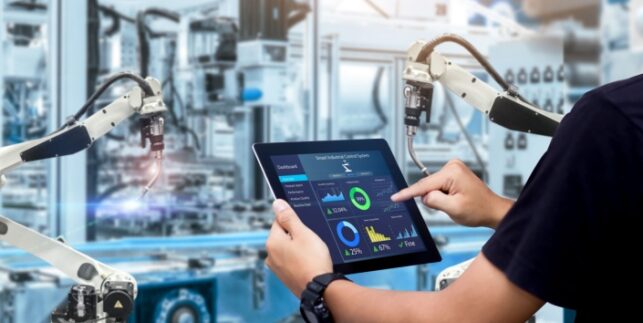Matics Webinar: Implementing Sustainability Metrics at Your Manufacturing Site

Sustainability has never been more important, and manufacturers all around the world require new solutions to develop and implement their sustainability programs effectively. Matics recently hosted an engaging live webinar on sustainability challenges and solutions and the role that real-time operational intelligence plays (RtOI).
You can check out the full webinar to hear insightful discussion on these topics from Tetro Ltd. CEO Ilan Ben Meir and VP of Operations at Matics Assaf Buch, moderated by Business Development Manager at Matics Elie Slama. Read on to find out more about key takeaways from our most recent live webinar.
Key Takeaway 1: Sustainability in Modern Manufacturing Has Never Been More Important
Business Development Manager at Matics Elie Slama provides a brief introduction to the topics at hand with an overview of the importance of sustainability in modern manufacturing and how manufacturers can implement new practices effectively.
With a focus on zero-waste and zero-landfill operations, manufacturers face significant pressure to develop an effective approach for managing operational sustainability. Implementing sustainable material and energy waste management practices provides manufacturers with benefits in environmental policy compliance, operational efficiency, and cost reduction.
This journey is one of continuous optimization and improvement, one that manufacturers need end-to-end process visibility and analysis to achieve. However, the complexity of processes and operations with many machines, stakeholders, and other factors poses a major challenge. Matics’ Real-time Operational Intelligence gives manufacturers the resources and tools they need to face the challenges of sustainable waste management.
Key Takeaway 2: Productivity and Sustainability Don’t Have to Be at Odds
Tetro Ltd. CEO Ilan Ben Meir discusses the importance of sustainability in manufacturing, the challenges of implementing sustainability and its solutions, and his own company’s journey to becoming a sustainable manufacturer.
Tetro Ltd. is a tier-1 OEM manufacturer that provides complete vertical development for leading brands around the world through R&D, co-development, and fabrication. Founded in 2007, the company now has over 1,200 employees and manufacturers over 150,000 SKUs. It is a part of the multinational Starry group, which has over 5,000 employees and operates eight factories.
Tetro Ltd. first implemented a real-time system in 2009. However, their goal at this time wasn’t’ sustainability. Instead, they made the decision to implement a real-time system to reduce manufacturing costs, optimize resource utilization and allocation planning, and develop accountable performance metrics.
The benefits of their real-time implementation were very clear. They reduced costs and were able to shift from correction to prevention by identifying issues and developing solutions in real-time. Overall, the company shifted from being reactive to proactive.
When the Paris Climate Accords were adopted in 2015, the industry began to shift its focus toward sustainability. Tetro Ltd. was no exception, realizing the importance of mitigating CO2 emissions and the need to develop a sustainability program.
As they developed their program, they found that real-time operational intelligence was an integral tool in doing so. The need to measure and monitor the carbon footprint of their operations was clear, and the data collection and analysis provided by real-time operational intelligence made this task possible.
While the carbon footprint in terms of CO2 emissions per kg of raw material was already available, Tetro Ltd. needed an effective method to gauge the carbon footprint of their processes. Working with Matics, they were able to develop a way to do so with the customization and support provided by the RtOI solution.
Implementing RtOI allowed Tetro Ltd. to approach sustainability by:
- Connecting all machines and sensors to the solution and aggregating essential data
- Defining important metrics like energy consumption per kg of production, rejection rate, and cycle time
- Bringing all production information into a single source of truth to easily access and compare historical performance data
- Providing real-time performance analysis to understand which machines used more energy and why
- Carrying out sustainability metric analysis to directly translate energy consumption into CO2 impact
- Giving all stakeholders the information they need to make decisions effectively and rapidly
- Receiving ongoing support from Matics in the refinement and development of custom algorithms
- Using the increased understanding and continuous process improvement to update new carbon footprint and sustainability goals.
Key Takeaway 3: RtOI Delivers Value in More Ways Than One
Ilan Ben Meir also provides a specific example of how Matics’ RtOI provided the necessary insight to make the right decision in terms of sustainability, cost, and efficiency.
A forecasted for increased production meant that Tetro Ltd. would have to purchase an additional machine to increase production capacity. However, it was by no means obvious which supplier could provide the highest value while maintaining sustainability.
The facility already had three machines from different suppliers, and thanks to Matics RtOI, they were able to use historical performance data to determine which model would be the right choice for their new machine.
While cycle time was very similar for each, RtOI provided additional metrics by which to compare the machines. The solution captured and analyzed the energy consumption per kg of production, and this metric showed a stark difference between the machines. One machine showed much lower energy consumption per kg of production, which translated to greater sustainability and lower costs.
Utilization loss due to maintenance and reject rate were also captured and provided historical data to help make the best decision. With the wealth of information and analysis that RtOI provides, Tetro Ltd. was able to choose the best model for their new equipment acquisition.
Ilan Ben Meir talks about the important ways that sustainability is changing how manufacturers see ROI and other business metrics. With pressing environmental and social issues, sustainability becomes an important factor in decision-making on its own.
However, sustainability and profitability aren’t necessarily at odds. Many customers of Tetro Ltd. have specific sustainability requirements for partners and suppliers. With Matics, Tetro Ltd. is able to implement sustainability programs that satisfy these requirements and keep their customers happy. In fact, sustainability has played a significant part in continued year-over-year sales increases for Tetro Ltd.
Ilan Ben Meir stresses the importance of real-time solutions to meet the growing challenges of modern manufacturing. Real-time solutions aren’t an optional upgrade for ambitious manufacturers – they are now the baseline of the industry and something that every company needs to stay competitive.
Working with Matics, Tetro Ltd. has been able to achieve the end-to-end visibility and analysis necessary to implement its sustainability programs and continue fulfilling its commitment to sustainability and developing a circular economy.
Key Takeaway 4: Digital Transformation Is the Future of Manufacturing
VP of Operations at Matics Assaf Buch builds on the insight provided by Ilan Ben Meir with a closer look at the specific tools and resources that Matics RtOI provides to implement sustainable material management.
Modern manufacturers must maintain productivity, sustainability, and profitability. However, these three areas are closely connected, and the benefits provided by RtOI apply to all of them. By adapting a real-time solution to all stakeholders throughout an organization, manufacturers can take action and solve problems at every level more quickly and with better results.
Matics provides a solution that lets manufacturers transition away from the old way of managing information with Excel, a basic MES, or even paper documents. These antiquated methods provide minimal visibility, don’t offer real-time insights, and have no means for collaboration or workflow automation.
Matics lets these manufacturers switch from a reactive to a proactive approach. RtOI reduces latency at multiple points in workflows, allowing for issues to be discovered, analyzed, and resolved more quickly with automated calls to action for appropriate stakeholders.
Matics lets manufacturers achieve a digital transformation. While many manufacturers already implement computerization and some degree of connectivity, they haven’t progressed to the point where the true benefits of digital transformation become apparent.
RtOI delivers visibility, transparency, and predictive capacity. Each step of this digital transformation builds on the last. With end-to-end visibility and access to all important data, RtOI can then provide the understanding and analysis that leads to true transparency. From there, additional analysis and advanced planning tools can introduce predictive capacity that leaves manufacturers prepared for anything.
Key Takeaway 5: Using Data as a Foundation to Go Even Further Beyond
Matics RtOI is more than simply a data aggregation tool. It provides full production journey management, giving manufacturers more control over every aspect of their operations and allowing them to realize improved efficiency, reduced costs, and greater sustainability.
The system provides increased communication and collaboration tools that streamline operations. Instead of disparate communications, manufacturers can implement machine-based communication channels that ensure access and traceability in communications between stakeholders.
The increased visibility and transparency provided by RtOI lays the groundwork for effective workflow automation. As KPIs and other production information are monitored, events can be automatically triggered to provide the right stakeholders with the information they need when they need it. The appropriate calls to action are issued immediately, drastically cutting down reaction times.
Matics RtOI provides manufacturers with resources and tools to increase sustainability while maintaining quality. With Matics, manufacturers can:
- Build and manage product and job recipes
- Monitor material consumption in real-time
- Define an energy consumption model
- Monitor actual energy consumption in real-time
- Monitor rejected production
These important metrics give manufacturers the information they need to find the right balance between production parameters, material and energy consumption, and quality.
They are also important in the enforcement of recycling and other sustainability policies. Manufacturers can continuously monitor and compare actual production with standards in real-time to ensure that policies are implemented and enforced effectively. Matics excels in energy consumption monitoring, allowing manufacturers to monitor energy consumption as if it were any other raw material.

Changing the way people work in factories
Request a DemoLearn More About Sustainability in Manufacturing
The full webinar is available online for you to benefit from the insights provided by Ilan Ben Meir, Assaf Buch, and Elie Slama. If you’re interested in hearing how Matics can provide a solution for your operation’s unique challenges, you can reach out to our team to schedule a demo today.




